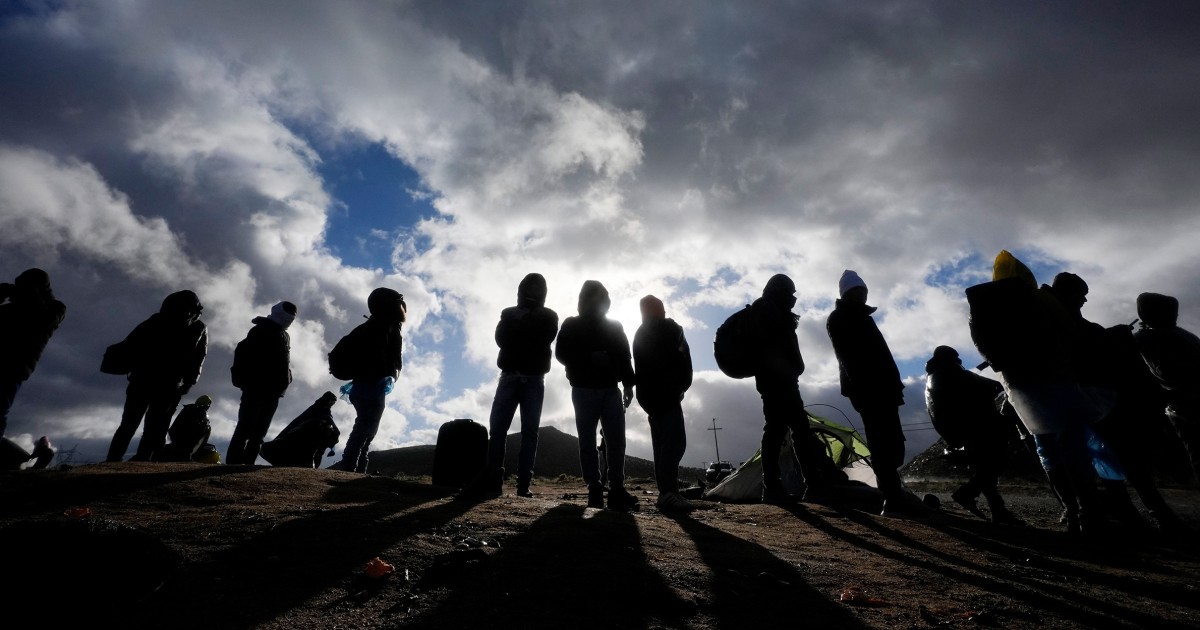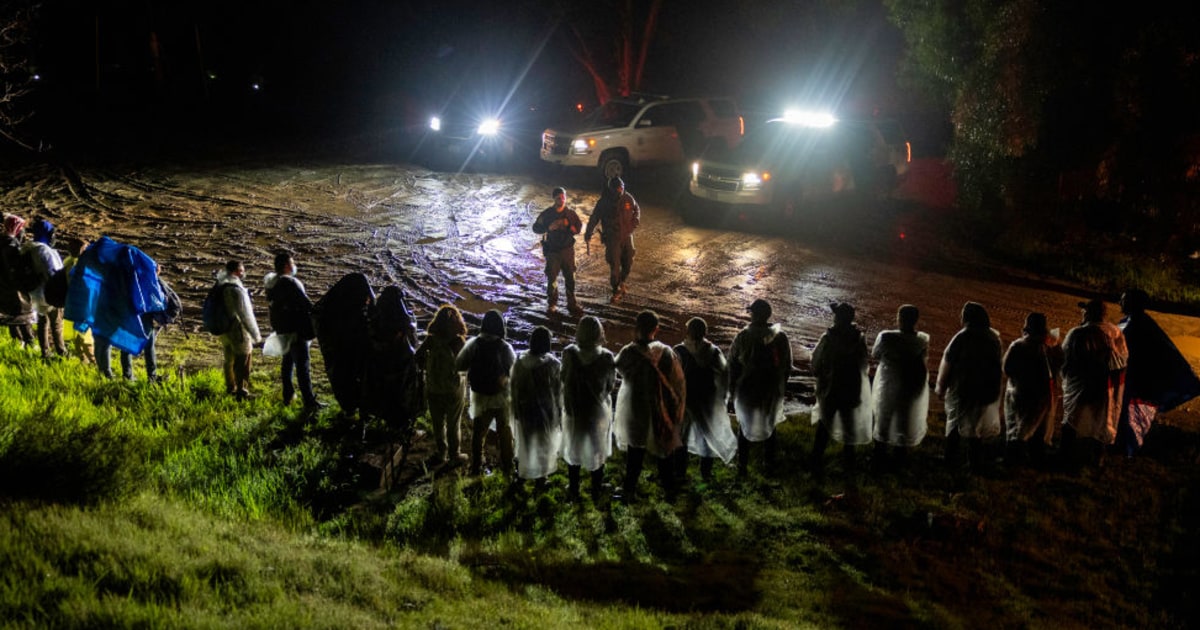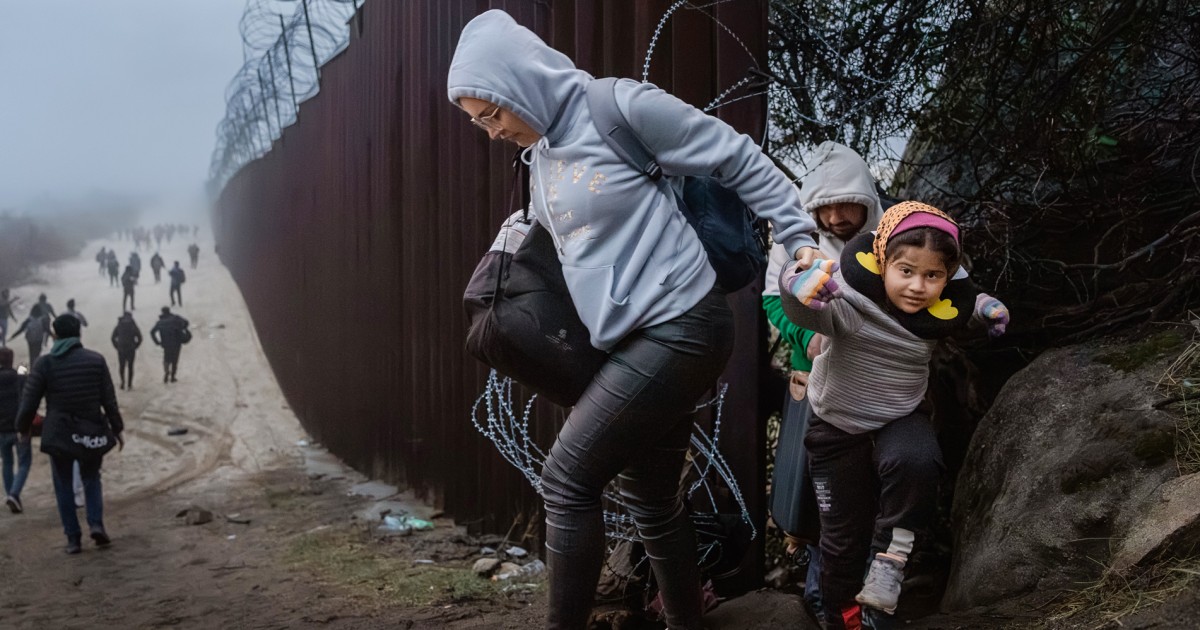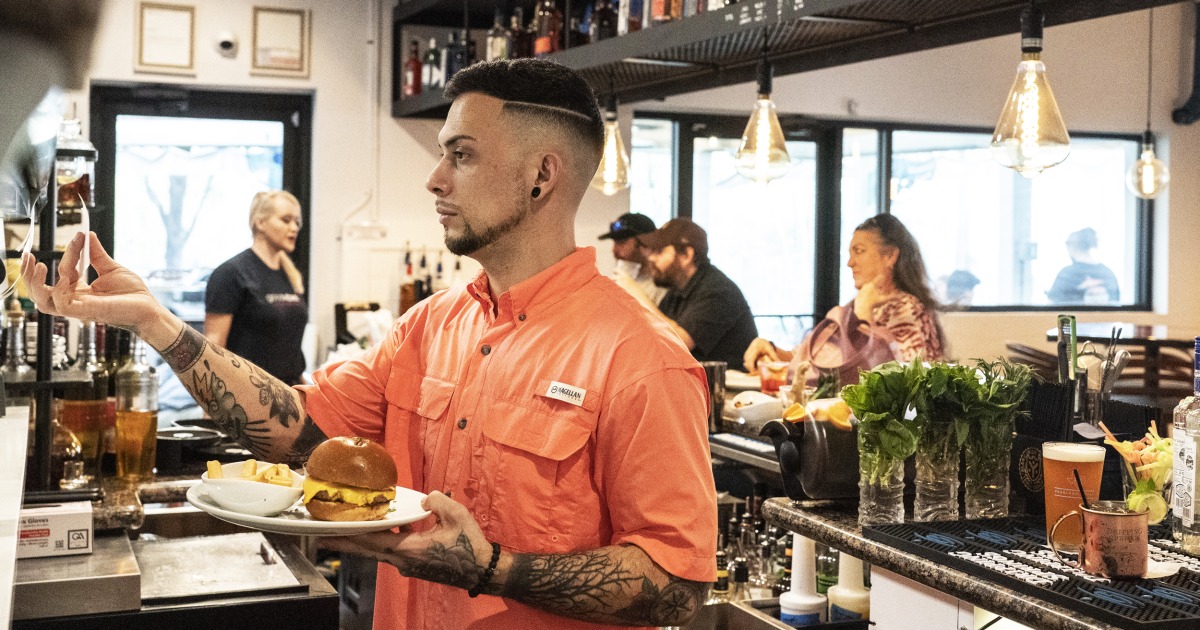BROWNSVILLE
.
- They were a large group, like 150 migrants, on a cold night last February.
Irma and her two daughters wanted to surrender to border agents but, thinking that they were going to return them directly to Mexico, they fled with many others.
For three hours they walked
, they ran, they hid in the mountainous darkness of Texas, until they couldn't take it anymore.
The Border Patrol found them.
They took their fingerprints, saw that they already had an immigration file, and returned them to Mexico.
That is precisely what they did not want: to
return to Mexico
, the country where this mother of two children aged 15 and 7 has felt stranded since August 9, 2019. It was that summer when she requested asylum in the United States but they were returned to the country neighbor to wait for his court date, like so many others.
[A Mexican girl drowns while trying to cross the Rio Grande]
There were only three more cases among the
tens of thousands under the program Stay in Mexico
(informal name of the Protocols for the Protection of Migrants, or MPP according to its official acronym in English) with which the Donald Trump Administration tried to dissuade the petitioners asylum.
The controversial program
forced them to remain in Mexico
while their cases were processed, and they were exposed to kidnappings, extortion, rape and all kinds of violence by criminal groups who saw this group of vulnerable foreigners as easy prey.
Shelters in Mexico's border cities are overwhelmed by the arrival of returned migrants from the United States.
March 26, 202101: 35
The end of the program is one of the promises on immigration that the new president, Joe Biden, has kept in his first two months in the White House.
Since February 19, asylum seekers from the Stay in Mexico program can wait for their cases in the United States.
3,696 people have
already
entered
, day by day, with days in which they have processed more than 250 migrants.
[Shelters in Mexico's border cities are overcrowded by the arrival of returned migrants from the US]
But, behind the celebrations and victories of pro-immigrant groups, the future of the majority of foreigners processed under the Stay in Mexico program is uncertain.
"The situation is desperate,"
says Irma from Matamoros, in the state of Tamaulipas, Mexico.
This Honduran immigrant did not want to give her full name for fear of having security problems.
According to the Mexican government, Tamaulipas is one of the most dangerous states for migrants, along with Coahuila, Veracruz and Chiapas.
Yéssica and her husband review the MPP documents that were delivered to them across the border.Caleb Olvera
And uncertainty is added to the risk: "We don't know what will happen to us and if they are really going to give us a chance."
In her nearly two years in Mexico, Irma
crossed to Hidalgo, Texas several times
for her hearings with the immigration judge.
He denied her asylum and she did not appear at her opportunity to appeal.
Thus she entered an administrative and geographic limbo: she is a migrant under the Stay in Mexico program stranded on the other side of the border but without an open process in the United States.
No guarantees of obtaining asylum
But in that double limbo she is not alone.
When Biden finished with Stay in Mexico, more than 40,000 migrants from this program already had their asylum cases closed or inactive, according to data that the TRAC center provided to Noticias Telemundo Investiga.
And only 1.5% of those who closed their cases achieved the desired asylum.
["My baby is hungry and thirsty": this mother on the border begs that they be cared for]
The
national average for asylum granted is 46%
in the last two decades, but denial of asylum has been on the rise since 2012, according to data from the TRAC center.
Winning it depends to some extent on the immigration judges who solve the case, as shown by those same data, and it is even more difficult to have a lawyer defend the case.
And that, having a lawyer, was something almost impossible for the petitioners stranded in Mexico.
Activists and jurists are asking for a new opportunity for the cases to be considered again because, in their opinion, the processes of Stay in Mexico did not guarantee an adequate asylum process.
"My baby is hungry and thirsty": this mother on the border begs that they be cared for
March 25, 202101: 45
Jodi Goodwin, one of these lawyers, believes that
the hearings they had were unfair
"due to the violations of due process, so people had to endure to be able to reach the courts and the danger that everyone ran when they were in Mexico waiting" he told Noticias Telemundo Investiga.
But with new arrivals at the border booming and detention facilities saturated, the Biden administration has not responded what it will do with them.
[Biden negotiates with Mexico to return all migrants who arrive at the border except minors]
Also, for now, only four ports of entry are processing migrants with PPM cases still open.
On a 2,000 mile long border
, the Matamoros, Reynosa, Ciudad Juárez and Tijuana accesses are active.
Thousands of migrants are in other border areas and the wait is eternal.
Pregnant at the border
In the case of the Venezuelan Yéssica Pérez, that wait coincided with her pregnancy.
For months, neither she nor her son left the small apartment they
rented for $ 200 a
month in Nuevo Laredo;
only her husband walked the street.
For her 4-year-old son there has been no school or walks in the park: she is terrified to know that armed people could be found everywhere they go.
The Venezuelan Yéssica Pérez in her small apartment in Nuevo Laredo, Mexico, Caleb Olvera
"
My blood pressure would go up, it
would go down, I would lie down, rest because of the same anxiety that they wouldn't call us," she said, nine months pregnant.
The calls you are referring to are the formalities to cross into the United States, now that Stay in Mexico has ended.
The crossing is coordinated by UNHCR
, and migrants must register on a website, Connecta, which experienced several problems during the first weeks of operation.
Afterwards, they must wait a couple of calls to review their cases and specify the date of entry to the United States.
A UNHCR worker processes a family under MPP in the now closed migrant camp in Matamoros, Mexico.
For the rest of the petitioners, the process is online and by telephone. Credited by OIM / Credited by OIM
Yéssica Pérez received the first call a week later than scheduled.
Others complain that it has not yet reached them.
The international organization ensures that it is working 24 hours a day, seven days a week, to advance the registration process.
And not everything depends on them, they say.
"It is important to point out that the United States Government
is the one who is determining where to cross
, how many people cross, what types of cases cross first," said Silvia Garduño, UNHCR spokesperson in Mexico.
["We don't want to steal anything but to have a future": climate migrants seek the American dream but are returned to Mexico]
Pérez crossed the border a day after speaking with Noticias Telemundo Investiga and he did so thanks to the intermediation of an NGO, but his case is unusual.
The dilemma for organizations that coordinate or host migrants stranded in Mexico is
what to do if new ports of entry do not open soon
.
The International Organization for Migration (IOM) sees as too risky the transport of asylum seekers between Mexican border cities, with towns and highways controlled by the cartels, said a spokesman.
Kidnapped on the way to court
Since the creation of Stay in Mexico in 2019, migrants have not stopped denouncing the situation of insecurity they have had to face every day.
"They just stop and put you on the trucks, without saying anything else," recalls Brenda, a 26-year-old Guatemalan.
In mid-March 2021, at dawn on the dusty Texas border, Noticias Telemundo Investiga met Brenda, her husband Leonidas, and their two-year-old daughter.
The baby, in the father's arms, was wrapped in a gray blanket and protected by a pink hood.
Their breaths were still ragged by adrenaline.
They had just crossed into the United States
and they had done it in an irregular way, crossing the river on a raft, almost groping in the dark, along with dozens of families.
A Mexican girl drowned while trying to cross the Rio Grande
March 26, 202100: 32
They applied for asylum in July 2019 in Laredo, Texas.
The US government sent them back to Nuevo Laredo, Tamaulipas, to wait for their court date, set for October 23, 2019. They decided to wait in Mexico City because it seemed safer, and on their return to the border to be able to attend their hearing with the immigration judge, they were mugged.
“
When we were going to court, they kidnapped us
.
It was horrible, it was traumatic.
A car crosses us and they tell us 'get in'.
We spent three weeks in a winery, without communication.
It was a horrible place, there were no conditions there to live, there were a lot of people ”.
[Under a bridge and on the ground: migrant families sleep for days in deplorable conditions in Texas in Border Patrol custody]
They asked them
for
$ 30,000
for all three and paid the ransom.
"In the end we had to sell the house in Guatemala and we got into debt," he recalls.
The baby suffered severe malnutrition.
They returned to their country, the threats to their family persisted, and now they are trying again by crossing irregularly.
"We are very nervous, we do not know if they will give us the opportunity to speak, to listen to each other, or the opportunity to have a lawyer," she explains visibly distressed.
As soon as they crossed, the Border Patrol
gave them a clear plastic bag
and a paper token to store their most important belongings.
And she, without really knowing what it is for, keeps it in her hands and squeezes her fingers.
Brenda and her family, who prefer not to show their faces for fear of retaliation in their country, wait for the Border Patrol to arrest and prosecute them.Caleb Olvera
Her husband died while they waited for an answer
Tears, hugs and phone calls is what is commonly seen around the Brownsville, Texas port of entry.
There
every day migrants who were stranded in Mexico are processed
with Stay in Mexico but whose cases are still open.
They still have a chance to ask for asylum.
The Biden Administration is releasing them and, from their new homes in the United States, they will appear in weeks or months before the judge.
The effort is not over even for them.
Several activists and lawyers who have reviewed the cases say that one party has reasons for some pessimism: They have already lost their asylum cases and are in the process of appeals.
[Mexican parents visit their children in the US after decades without seeing each other thanks to this initiative] This
is the case of the Honduran Evelyn Hernández, who
lived for months in the Matamoros migrant camp
.
The open-air tents with hundreds of migrants, near the Rio Grande, portrayed to the world the vulnerability and precariousness of the Stay in Mexico program.
Even Jill Biden, the first lady, visited that camp in December 2019 and said "this is not who we are as Americans."
Migrants from the countryside were also the first to be processed and the Mexican authorities closed it down.
Hernández knows that his case was denied but
sees the appeal as a new opportunity
.
At least now you will be able to reconnect with your 4-year-old son who was already in the United States.
A few meters from Evelyn Herández sits a 45-year-old Cuban woman, Yudelis Figuera.
He also just entered the United States through Brownsville, Texas.
With her she carries two backpacks: one contains documents and the other,
her husband's clothes and an urn.
At the border, she had to tell agents that her husband, with whom she was seeking asylum during the Stay in Mexico program, died while waiting.
Already in the United States, Yudelis Figuera shows the urn with the remains of her husband, who died in Matamoros, Mexico, while they awaited his court of MPP. Damia Bonmatí
“Here I bring your urn
.
And clothes, some things about him, that I didn't want to get rid of ”, he shows us,“ it was a cardiac arrest.
All the stress of waiting: what if they denied us, what if we delayed.
That if we were not going to pass, that if we had to continue here and all that.
Everything is stress, all that tension made him very depressed ”.
Her husband died seven months ago.
In Mexico they lived in a rented apartment and worked to sustain the wait: he in construction and she in a maquila and a Mexican restaurant.
He, says Figuera, was maddened with happiness at the idea of one day arriving in the United States.
His eyes are watering.
And he puts the urn back in his backpack.








